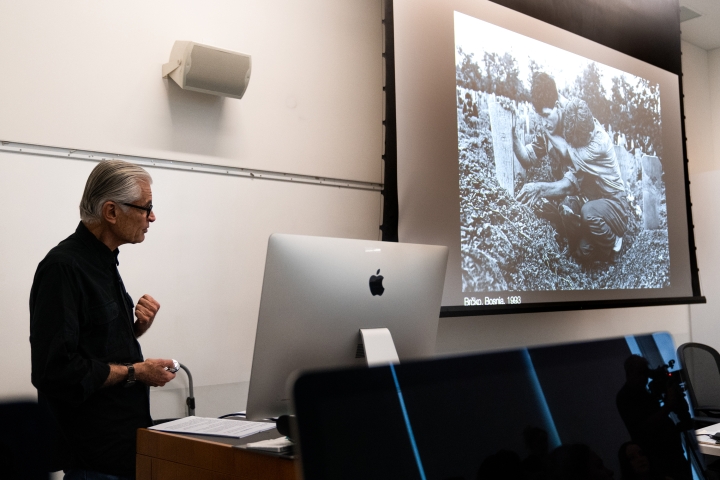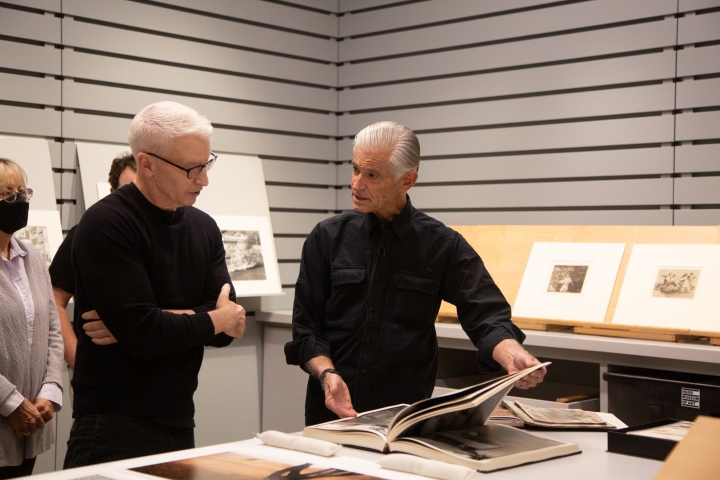On Sunday, May 7, photojournalist James Nachtwey ’70 will take an unusual step from behind his lens to appear on the CBS news magazine 60 Minutes.
Soon after the invasion of Ukraine in February 2022, Nachtwey began documenting unspeakable atrocities by Russian troops in civilian homes and neighborhoods.
His unsparing photographs in The New Yorker of the death and destruction in Ukraine, and the early resistance around Kyiv, recently won an American Society of Magazine Editors award.
Nachtwey was interviewed on campus last September by 60 Minutes correspondent Anderson Cooper.
“I hope the 60 Minutes piece will give people a better understanding of the motivations, commitment, and effort that goes into the photographs they see,” Nachtwey told Dartmouth News. “My archive is a comprehensive visual record of some of the most significant events and critical social issues of contemporary history.”
The acclaimed documentarian explained his general aversion to the limelight when he accepted a 2007 TED award—just one of a long string of honors for outstanding achievement.
“As someone who has spent his entire career trying to be invisible, standing in front of an audience is a cross between an out-of-body experience and a deer caught in the headlights,” he remarked, before narrating a gut-wrenching slide show spanning decades and continents: sectarian violence in Northern Ireland, civil wars in Central America, the destruction of Palestinian refugee camp, house-to-house fighting in Bosnia, the end of apartheid in South Africa, starvation in Somalia, death camps in Rwanda, rebellion in Chechnya, inhumane orphanages in Romania, poverty in Indonesia, heroin addiction in Pakistan, ravages of Agent Orange, victims of AIDS, genocide in Darfur, the fall of New York City’s Twin Towers on 9/11, and the lingering human toll of the Iraq Wars.
While fellow journalists often call Nachtwey a war photographer, he describes himself as an “anti-war photographer.”
Nachtwey first realized the power of images to bring home the unvarnished truth about wars and civil rights struggles while he was at Dartmouth, majoring in art history and political science.
“Pictures had a powerful influence on me,” he told his TED audience. “Our political leaders were telling us one thing and photographers were telling us another. I believed the photographers and so did millions of other Americans.”
After graduation, he worked at a local newspaper in New Mexico, embarking four years later on a freelance career in New York, and becoming, in 1984, a contract photographer for Time magazine.
When not on the road, Nachtwey lives and works in Hanover. The Hood Museum of Art has acquired over 500,000 of his images and he’s helping to edit and digitize them, and to develop text about the people and situations immortalized in the photos.
“With the Nachtwey photography archive, Dartmouth can share eyewitness reporting of some of the most important moments in world history over the last 50 years. Working for prominent news agencies throughout his career has brought Nachtwey to global hotspots from Kosovo to South Africa—as well as extensive coverage of domestic events including 9-11 and the opioid crises,” says John Stomberg, the Virginia Rice Kelsey 1961s Director of the Hood.
In addition, as a provostial fellow, Nachtwey has taught many master classes. The 60 Minutes crew filmed him at several locations, including his studio on campus, the Hood, and the classroom of Mark Williams, associate professor of film and media studies, with whom he has co-taught a course based on his career, From the Fall of the Wall to 9-11.

As cameras rolled on the first day of Williams’ class, U.S. Broadcast and Electronic Journalism History, Nachtwey gave a guest lecture.
“He offered an overview that included his years at Dartmouth and how he essentially taught himself photography, having been inspired by the powerful examples of photojournalism that had become prominent during the Vietnam War,” Williams says. “The curated examples of his work live on the border of reportage and compelling art, formally dynamic, worldly, inspiring, and yet often quite troubling. The students were, of course, deeply impressed.”
Nachtwey says he’s glad to have Dartmouth as a base.
“Having Dartmouth’s support has allowed me to develop my archive as a visual resource for scholars, students, teachers, historians, policy makers, nongovernmental organizations, and researchers and commentators interested in documentary photography.”
Update: The 60 Minutes story on Nachtwey aired on Sunday and can be viewed online.
